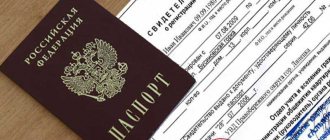Registration rules
Taking into account who exactly is registered and what type of registration is issued, there may be some differences in the registration deadlines:
- At the place of residence. Registration indicating permanent place of residence. Marked as a stamp in the passport. After deregistration, a new registration must be made within the next 7 days.
- At your place of residence. A person who has arrived in another region and wants to stay there longer than 90 days must apply for a temporary residence permit. After registration, a certificate is issued confirming the fact of registration.
- Registration of newborn children . Within 30 days, all documents must be completed and registration for the child must be made. This procedure is carried out at the territorial office of the migration service.
- Registration of foreign citizens . To obtain the status of a temporary residence permit (temporary residence permit) or residence permit (residence permit), you first need to obtain registration. Registration time – 3 days from the moment of arrival, 10 days for registration in Moscow and St. Petersburg.
In case of violation of the terms of registration, citizens of the Russian Federation will face an administrative fine, and foreigners will face a fine and deportation.
Why do you need registration in your passport?
Violations and errors in registration issues often arise due to the fact that internal migration policy is regulated by several legislative acts at once.
To avoid an unpleasant situation and proceedings, citizens and persons living in the Russian Federation need to familiarize themselves with the following codes and federal laws:
- Civil Code - contains basic provisions concerning the rights and obligations of citizens, residents and visitors to obtain permanent and temporary registration;
- Administrative Code - establishes the limits of administrative liability, as well as the amount of fines; the document specifies the validity period and procedure for creating a temporary or permanent registration;
- Housing Code - regulates the standards of living conditions for citizens; the code specifies the minimum mandatory standards for the square footage of a dwelling under which citizens are allowed to move into it;
- Family Code - establishes the rights of minors, regulates the rules of residence for children;
- Federal Law No. 5242-1 “On the right of citizens of the Russian Federation to freedom of movement” also contains some registration standards.
Internal migration is quite strictly regulated, since the government is interested in controlling the movement of citizens. Regulation of this issue allows for the preventive resolution of tax violations and property disputes.
Penalties for late registration
The size of the penalty directly depends on who exactly it is imposed on. In each case, the amount is determined individually.
At the place of residence
If within 7 days after deregistration a person has not re-registered in a new place, and there is no registration stamp in the passport, the amount of the penalty may vary significantly and depend on the person to whom the sanctions are applied:
- a person who does not have a registration will have to pay from 2,000 to 5,000 rubles;
- an apartment owner who allows a stranger without registration to stay in his home will pay a fine in the amount of 4,000 to 8,000 rubles;
- if an illegal immigrant permanently resides in premises owned by a legal entity, the amount of the fine may rise to 800,000 rubles.
If violations are found in large cities of federal significance (Moscow, St. Petersburg), the amount of the fine increases.
At the place of arrival
If certain deadlines for obtaining temporary registration are violated, fines in the amount of 2,000-3,000 rubles are applied to the person who neglected the rules.
[vote2x id=»1398″ align=»center»] We advise: How to apply for temporary registration in Krasnoyarsk?
Newborn baby
If the child has not been registered within 1 month after birth, the parents will have to pay a fine of 2,000 to 2,500 rubles.
Responsibility for violation of rules and delay
Law enforcement agencies and the border service monitor compliance with population migration norms. The legislation has simplified the procedure for obtaining registration, making it free for citizens of their country, but many neglect this, therefore, if the registration requirements or deadlines are not met, a fine may be imposed in accordance with the Administrative Code of the Russian Federation (Article 19.15.2. and Article 19.15.1. Code of Administrative Offenses of the Russian Federation).
What fine will I have to pay?
Let us dwell in more detail on what the fine is if a person does not register on time. The fine for late registration is established in accordance with the regulations of the Code of Administrative Offenses of the Russian Federation. The amount of the fine imposed for overdue registration at the place of residence varies from 2 to 7 thousand rubles, depending on the region. Those who did not register within the 7 days allocated for registration are also subject to sanctions.
Foreign citizens who lack at least temporary registration may face a ban on entry into the country and immediate deportation. Sanctions also apply to people who allow a person to live in their home without permanent registration.
Legal entities also fall under administrative punishment if they provide housing for the illegal stay of citizens without registration. If they have overdue registration at their place of residence, the fine will range from 300 to 800 thousand rubles.
Terms and procedure for payment of fines
After the administrative violation decision comes into force, you will have 60 days to pay the fine. Today they provide a unique indicator (account) to which you can transfer funds. There are several ways to pay off debt:
- Go to the bank and pay at the cashier.
- Pay via the Internet, including through Sberbank-online or State Services.
- Use the self-service terminal.
Keep the receipt after payment in case there is a failure in the system, you will be able to prove that you are right.
How to pay the fine?
After determining the expired registration, a protocol is drawn up stating that the violator has been brought to administrative responsibility. Then the exact measure of punishment itself is established.
The violator must be given a copy of the compiled protocol.
10 days after the decision is made, it comes into force provided that there is no appeal in court. A fine must be paid within 60 days. The offender is given details that include a unique accrual identifier (UIN), to which the money must be transferred.
We advise: How to obtain temporary registration in Omsk?
The fine can be paid in several ways:
- at a bank branch through a cash desk;
- using Internet banking;
- through a self-service banking terminal.
Do without paying
In rare cases, renewal of registration can be carried out without paying a fine.
To do this, you must have compelling reasons that can be documented.
Such reasons include, for example, hospitalization, funeral of a relative, long trip for work matters, etc.
In other cases, the person applying for renewal of the certificate, if the registration is expired, is obliged to pay the amount specified in the law to the state.
You can find out what to do if you have nowhere to register, as well as how to renew the registration of a foreign citizen on our website.
Appealing penalties
By going to court, everyone has the right to appeal the fine received. This can be done within 10 days after receiving the decision on the imposed sanctions.
To challenge a fine, you need to prepare documents that will serve as evidence (for example, certificates of hospital stay or other papers confirming the impossibility of registration within the allotted time frame) and draw up a statement of claim.
Before going to court, it is better to use the services of lawyers. This will help you understand how likely the process is to complete successfully. If the plaintiff is not completely sure that he is right, it is better not to start the case.
Failure to register on time may result in a fine. This applies to both Russians and foreigners. Adhere to the established deadlines for registration, and you will not fall under administrative liability.
The legislative framework
To determine what amount of penalty will be applied in each specific situation, it is worth referring to the current legislation. Only it regulates all the nuances of the procedure.
The main list of sanctions is enshrined in Article 19.15.1 of the Code of Administrative Offenses of the Russian Federation. The regulatory legal act provides for the application of punishment for persons who untimely applied to a government agency to obtain a residence permit.
It would be useful to study the provisions of the Housing Code of the Russian Federation, which also contains rules governing registration. Citizenship issues are enshrined in the Constitution of the Russian Federation.
Is there criminal liability?
The law does not provide for criminal liability for violation of registration terms. However, the Criminal Code of the Russian Federation contains Article 322.2, which allows a citizen to be held accountable for having a fictitious registration.
Punishment will be applied in the following situations:
- the citizen has registered, but does not intend to live at the place of registration;
- false information or papers were sent to the Federal Migration Service of the Russian Federation, and the citizen himself was aware of this;
- the owner or tenant of the premises has registered a person in his property, but is not going to let him in.
If this occurs, a monetary penalty in the amount of 100,000 to 500,000 rubles will be applied. Additionally, a person may be subject to forced labor for up to 3 years or imprisoned for 3 years.
What is registration
The passport contains basic information about the citizen: his personal data, as well as special marks, including a stamp with information about his permanent place of registration. For a child under 14 years of age, such a document replaces a birth certificate and a special certificate from the passport office. There is no term “registration” as such in legal practice; this word is used in everyday life out of habit.
Legally, the procedure for attaching to a specific address is called registration.
Registration of children at their place of stay - who is fined for absence?
Only the culprit himself can be fined for lack of registration. But:
- Children under 16 years of age are not subject to administrative liability under the law. Their parents cannot be punished with a fine, since in this case they are not defendants;
- The child actually lives on the territory of his parents, which means he is exempt from penalties.
The modern procedure for registering a new person is such that it is almost impossible to miss registration. Since registration will be needed in the future for registration at the clinic and in the queue for a place in kindergarten, it must be done as soon as possible. This procedure is usually carried out immediately after receiving the birth certificate. You can change your registration for a minor only at the address of one of the parents. This is monitored by the guardianship department.
Fine for false registration
It happens that the owner of the living space takes responsibility for registering a citizen fictitiously:
- Using fake documents or without them at all;
- If the citizen does not plan to live at the specified address.
As a rule, this is done for some monetary reward.
For this, administrative as well as criminal liability is also provided for all participants.
- Fine in accordance with the income of the culprit (owner of the living space) for 3 years ;
- Forced labor;
- Imprisonment for a period of 1-3 years ;
- Prohibition to hold certain positions or engage in professional activities.










